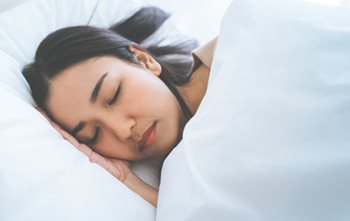
The Missing Piece - The Role of Gut Health in Sleep
“A third of US adults report that they usually get less than the recommended amount of sleep. Not getting enough sleep is linked with many chronic diseases and conditions such as diabetes, heart disease, obesity, and depression that threaten our nation’s health. Not getting enough sleep can lead to motor vehicle crashes and mistakes at work, which cause a lot of injury and disability each year. Getting enough sleep is not a luxury—it is something people need for good health. Sleep disorders can also increase a person’s risk of health problems.”
Insomnia is the inability to obtain an adequate amount or quality of sleep. The difficulty can be in falling asleep, remaining asleep, or both. Short-term, or transient, insomnia is a common occurrence and usually lasts only a few days. This is usually caused by a change in bedtime, stress, or short-term illness.
Long-term or chronic insomnia lasts more than three weeks and increases the risk for injuries in the home, at the workplace, and while driving because of daytime sleepiness and decreased concentration. Chronic insomnia has many causes. This course is intended to educate on these causes. Solutions and the role of gut health in sleep will be explored.
Questions? Check out our FAQs page and How Online IV Certification Works!
Objectives
Upon completion the participant will be able to:
- List what factors affect sleep.
- Describe the different sleep cycles, both REM and
non REM and their role in health. - Discuss the relationship between serotonin and melatonin.
- Explain where serotonin is mostly made in the body.
- Explain how optimum digestive health can lead to better sleep.
- Identify factors that cause disrupted circadian rhythms.
Curriculum
Chapter 1: What is Quality Sleep?
- Definition of quality sleep
- How long should it take to fall asleep?
- Average sleep time for age groups
Chapter 2: What Happens When We Fall Asleep?
- Detoxification, HGH produced
- Stages of sleep
- REM stage
Non Rem stage- Stage 1
- Stage 2
- Stage 3
- Review
- Review question and answer
Chapter 3: Melatonin/Serotonin Link
- Melatonin, what it is, what it does
- Where is melatonin made?
- Serotonin, what it is, what it does
- Where is serotonin made?
- How melatonin is made
- Review
- Review question and answer
Chapter 4: Circadian Rhythms
- Definition of a circadian rhythm
- Different types of circadian rhythms
- Light-dependent
- Secondary or peripheral
- Biological clock genes
- Skeletal gene
- Review
- Review question and answer
Chapter 5: Circadian Clock Gene Deregulation
- Cancer and circadian rhythm dysfunction
Tumor suppressing genes- Per 1 and Per 2
- Melatonin and cancer
- Sleep or lack of sleep
affects - Review
- Review question and answer
Chapter 6: Factors That Affect Sleep
- Food
- Emotions
- Light
- Exercise
- Medical problems
- Environment
- Medications (downloadable pdf)
- Medical conditions (Alzheimers, pain, bowel and bladder issues and many more)
- Review
- Review question and answer
Chapter 7: Sleep Hacks
- Nighttime routine
- Blue light suppresses melatonin
- Avoid screens (website to download blue light blocker)
- Bedtime ritual
- Sleep hygiene
- Natural light during
day - Avoid eating, caffeine or alcohol too early to bedtime
- Review
- Review question and answer
- Resources PDF handouts
Chapter 8: References
- California Bill 241
- Implicit Bias in Healthcare
- What is Implicit Bias?
- Implications of Implicit Bias in Healthcare
- How to Reduce Implicit Bias
Price: $12.00
Contact Hour: 1

Course Author

Brooke Lounsbury
Brooke Lounsbury, RN, has over 26 years of experience as a nurse. Her primary field was in Home Health and Hospice until leaving mainstream nursing in 2008 to teach holistic health classes devoted to helping people empower themselves through education, public speaking engagements, classes, and coaching -online and in person. Topics include digestive health, fermentation, sleep hygiene, and the effects of our technology (computers, wifi, cellphones, etc) on our health and traveled to Austria to receive further training and is an EMF consultant and home assessment mitigation expert.
Her latest project is her "Intro to Writing CE", a course to empower nurses on how to write a continuing education course!
She is available for writing course consultations, and can be reached at basicsrn@gmail.com.
Course Accreditation
See our Accreditation Statements page to view our accreditation information.